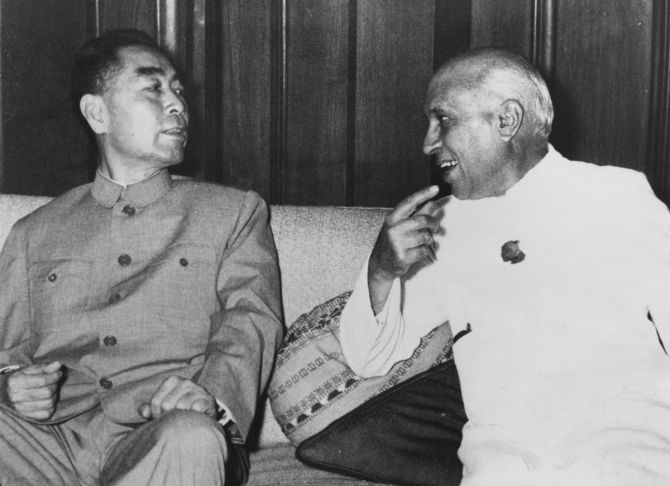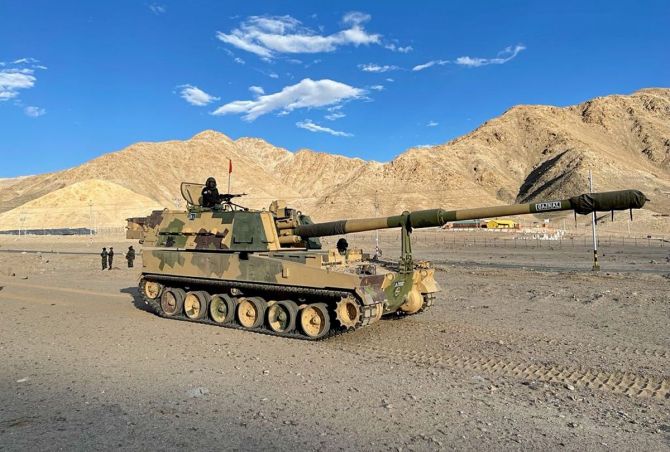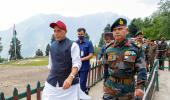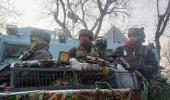The answer to Chinese tactics of nibbling territory is not defence of every inch -- a military impossibility -- but instead, nibbling at Chinese territory wherever we are in a stronger position, counsels Colonel Anil A Athale (retd).

As 2022 was moving toward its end, the clash between Indian and Chinese troops in the Tawang sector of Arunachal Pradesh on December 9, 2022 prompted a furious debate in India.
There have been many doomsday predictions largely based on our 1962 defeat there.
The reason for their unreasonable pessimism is the wrong reading of the history of the 1962 conflict.
The shadow of 1962 seems to fall on our assessment of the future intentions of the Chinese.
An otherwise biased work, Neville Maxwell's India's China War has one gem of an observation. Maxwell claims that in 1962 uninformed and inflamed public opinion goaded a reluctant India into an unwanted conflict with China.
The 'Forward Policy' in Ladakh that established token military outposts (not defences) were the result.
The military carried out a professional assessment (a top secret exercise Sheel) and suggested to the government to go slow till we built the necessary infrastructure in Ladakh.
Nehru's assessment that the Chinese would never attack given implicit American support went wrong when the Chinese used the opportunity of the Cuban Missile Crisis to 'teach India a lesson'.
A turning point was reached when on September 12, 1962, while on his way to Colombo, Nehru made a statement that he has ordered the army to 'throw out the Chinese'.
1962 was never about territory. The Chinese had already achieved its territorial objective of occupying Aksai Chin to facilitate a road link between Tibet and Xinjiang.
Its objective was to humiliate India and reduce its global status.
India played into Chinese hands when our military embarked upon a bizarre offensive to capture the disputed Thagla ridge that lay beyond the McMahpn line, a boundary claimed by India.
Military incompetence was solely responsible for our disaster in the erstwhile NEFA (then then North East Frontier Agency, now the state of Arunachal Pradesh).
Closer to our times, in 1986-1987 the Chinese tried similar tactics of nibbling off Indian territory.
Chinese troops occupied a small feature in the Sumdorong Chu valley.
Under the leadership of then prime minister Rajiv Gandhi and competent military commanders like army chief General Krishnaswamy Sundarji and IV Corps commander Lieutenant General Nuggahalli Srinivasa Iyengar Narahari, India mobilised superior forces in the area using our helicopter mobility and completely surrounded the Chinese.
For the first time after 1962, India occupied the dominating heights.
India was on the verge of attacking the Sumdorong Chu feature, but stayed its hand.
Rajiv Gandhi subsequently visited China from a position of strength and made the first positive breakthrough with the Chinese leadership.
We effectively buried the ghost of 1962. There was no running commentary like discussions in the media or Parliament and the military quietly went about doing its job.

The Indian Army that occupied various heights found remnants of 1962 when frozen skeletons of dead Indian soldiers, wearing cotton uniforms and shod in canvas shoes were unearthed by Brigadier (later Lieutenant General Malik).
The contrast between the ill-equipped soldiers of 1962 and well clad and the well armed soldiers of 1988 was stark and was used by the brigadier to motivate soldiers.
The soldiers' remains were honoured with proper funerals 26 years after the event.
The events of 2020 (the Galwan Clashes) and the recent attempt at Yangste Ridge, are more like the repeat of 1987-1988 Sumdorong Chu rather than 1962.
Yet the rhetoric of 'defending every inch' by the government and Opposition claiming patrolling by the Chinese in undemarcated areas as 'aggression' has muddied the waters.
The Chinese challenge is not the threat of capturing territory, but using it to impose an economic burden and distract attention from the then ongoing fight against the COVID-19 threat.
The answer to Chinese tactics of nibbling territory is not defence of every inch -- a military impossibility -- but instead, nibbling at Chinese territory wherever we are in a stronger position.
In short, instead of passive defence, we carry out an offensive defence.
Our population needs to be educated on these aspects and we should stop treating every small intrusion as a 'Panipat'.
Is it too much to expect that knowing the Chinese intent to undermine our global status and morale, we react in a mature manner as we did in 1987-1988?
In Galwan, the Indian Army gave a glimpse of our military acumen when we occupied the Kailas range and left the Chinese thunderstruck.

No military will ever discuss the nitty gritty of such planned offensive actions.
Transparency does not mean one constructs a bathroom with glass walls.
In democracy a via media is found when the military gives a clAssified briefing to select parliamentarians.
The current government tried it during the surgical strike and the Balakote air raid. But such was the cussedness of some politicians that they questioned our military professionals.
If the government has shied away from it this time, it has sound reasons.
2023 will test our patience and steadiness vis a vis China. Defence self-reliance, building border infrastructure and checkmating China in the Indian Ocean region is the right strategy.
It is worth repeating an observation by English historian James Douglas (Bombay and Western India, published in 1893): '(In India) inactivity or retreat in war is never seen as prudence or strategy in India. The side that stops making instant gains is regarded to be on the brink of ruin!'
Fighting with our age-old Panipat syndrome is the real challenge in 2023 and not the Chinese.
Colonel Anil A Athale (retd) is a military historian whose earlier columns can be read here.
Feature Presentation: Aslam Hunani/Rediff.com










